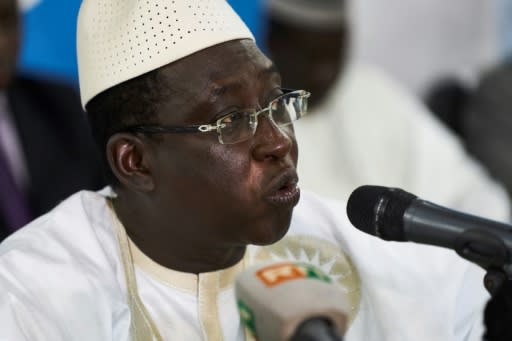Mali opposition protests, EU calls for transparency ahead of poll
After the first round of Mali's presidential election was marred by violence and accusations of fraud, EU observers on Tuesday called for more transparency and access during Sunday's run-off. It came as a thousand people gathered in the capital of Bamako to condemn alleged fraud in the July 29 poll. "With the second round approaching, it would be desirable for authorities to take all necessary measures to guarantee all voters can exercise their right to vote," said Cecile Kyenge, who heads the EU observer mission in Mali. Kyenge welcomed the publication of a detailed list of 871 polling stations where voting could not be held in the first round, due to outbreaks of violence. The incidents affected nearly a quarter of a million people, mostly in the Mopti and Segou regions in the centre and the northern Timbuktu region. Keita won 41.42 percent of votes in the first stage of the poll in the sprawling west African nation, easily ahead of opposition leader Soumaila Cisse, in second place with 17.8 percent. But mounting accusations of fraud and ballot box stuffing marred the days following the poll. - 'No united front' - Seventeen opposition candidates together held a meeting in the capital with around a thousand supporters to denounce such irregularities. "We will not accept the dictatorship of fraud in our country," Soumaila Cisse said, adding that the country had suffered too much in the past five years. But the Malian opposition is less united than it appears to be, according to political analyst Souleymane Drabo. "There is a united front to contest the results, but there is no united front to give votes to Soumaila Cisse," Drabo told AFP. One major opposition contender, Cheick Modibo Diarra, who gathered over 7 percent of the vote, was notably absent from the meeting. In the name of "transparency," the EU mission also repeated its call for the government to "publish the results of the first round of voting, polling station by polling station, as soon as possible," and to do the same after Sunday's runoff. European officials also urged authorities to "not limit freedom of expression" and to "guarantee unconstrained access to internet and social network." Last week, Renouveau FM radio, where wildly popular opposition activist Ras Bath has a weekly show, was closed. Meanwhile, social networks Twitter and Whatsapp were inaccessible on voting day for many, according to NGO Internet Without Borders. The constitutional court is due to officially announce the first-round results on Wednesday. Mali, considered a linchpin state in west Africa's troubled Sahel region, is one of the world's poorest countries, with most people living on less than $2 a day. Cecile Kyenge, who heads the EU observer mission in Mali (pictured 2013), says it would be "desirable" for authorities in Mali to ensure that all voters are able to vote in the run-off Malian opposition leader and presidential candidate Soumaila Cisse, pictured August 6, 2018, says they will not accept the "dictatorship of fraud" in Mali



